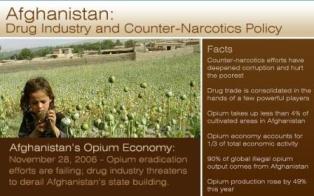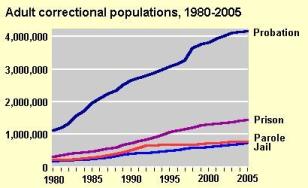A new report from the World Bank and UN is just the latest to warn of the difficulties facing drug warriors in Afghanistan. The report is comprehensive, exacting, and grim.
Medical marijuana came to the state legislature in Michigan this week, for the first time -- and made an unexpectedly strong showing.
Support the cause by featuring automatically-updating Drug War Chronicle and other DRCNet content links on your web site!
A new way for you to receive DRCNet articles -- Drug War Chronicle and more -- is now available.
In its latest annual studies on the prison and probation/parole population in the US, the Bureau of Justice Statistics reports the numbers are at an all-time high. Again.
The US Supreme Court Monday refused to hear appeals of state court decisions limiting law enforcement's ability to conduct searches in two states.
The killing of an elderly Atlanta woman in a drug raid last week continues to reverbrate through the community. With each passing day, the police are looking worse.
The California Supreme Court has ruled that qualified medical marijuana patients can transport their medicine -- as much as they need -- without being subjected to arrest and conviction.
Maine could become the next state where municipalities pass a lowest law enforcement priority marijuana initiative. Activists there have the process well under way already.
A Vermont states attorney has spoken out publicly against the drug war. All drugs should be "decriminalized" and drug abuse considered as a public health issue, he says.
A Michigan group has won approval from the State Board of Canvassers to begin a signature gathering drive for an initiative that would legalize the possession of marijuana by adults.
While he was Thai Prime Minister, Thaksin Shinawatra unleashed a drug war in which more than 2,500 were killed. Now that he has been deposed, the new government is promising to investigate the murders.
The military junta in Myanmar has been crowing about how it's cooperating in the fight against opium production, but a report from the Shan States suggests the military is turning a blind eye to production and trading by allied ethnic militias.
Harm reduction advocates are looking to the new Congress with hope.
Events and quotes of note from this week's drug policy events of years past.
Visit our new web site each day to see a running countdown to the events coming up the soonest, and more.
The effort to wipe out opium production has achieved limited success at best, hurt the poorest Afghans, and riddled the government with corruption from top to bottom, according to a comprehensive report released Tuesday by the United Nations and the World Bank.

World Bank report
"
Afghanistan's Opium Economy" says the counter-narcotics effort in Afghanistan is failing and the presence of opium in the national economy is so great that it infiltrates not only the economy, but the Afghan state, politics, and society. Providing a real alternative will take decades, not years, the study warns.
Afghanistan produced 6,100 tons of opium this year -- enough to make 610 tons of heroin -- and is line to produce even more next year. Opium accounts for at least one-third of the Afghan GDP, and profits from the trade end up in the pockets of government ministers, warlords, traffickers, and Islamic radicals alike. But with opium employing 13% of the workforce, it is also farmers, rural laborers, transporters, and gunmen -- and their families -- who earn a living off the trade.
Efforts to eradicate opium crops have the greatest adverse impact on the poor, the study found. If alternative development is going to take hold in the country, planners must keep that in mind, said Alastair McKechnie, World Bank Country Director for Afghanistan.
"Efforts to discourage farmers from planting opium poppy should be concentrated in localities where land, water, and access to markets are such that alternative livelihoods are already available," he argued. "Rural development programs are needed throughout the country and should not be focused primarily on opium areas, to help prevent cultivation from further spreading."
"The critical adverse development impact of actions against drugs is on poor farmers and rural wage laborers," said William Byrd, World Bank economist and co-editor of the report. "Any counter-narcotics strategy needs to keep short-run expectations modest, avoid worsening the situation of the poor, and adequately focus on longer term rural development."
"History teaches us that it will take a generation to render Afghanistan opium-free," said Antonio Maria Costa, executive director of UNODC, who used the release of the report to argue for a dual approach of aid and repression. "But we need concrete results now," he said, proposing to double the number of opium-free provinces from six to 12 next year. "I therefore propose that development support to farmers, the arrest of corrupt officials and eradication measures be concentrated in half a dozen provinces with low cultivation in 2006 so as to free them from the scourge of opium. Those driving the drug industry must be brought to justice and officials who support it sacked."
Despite his tough talk, what Costa did not say was that his proposal amounted to a recognition that effective eradication is impossible in the primary opium-producing provinces of the country this year. Although the World Bank-UN report barely mentions them, a resurgent Taliban, grown rich -- like everyone else -- on the profits of protecting the trade, has been a big reason why.
"Now that the control is more in the hands of the Taliban and their supporters, there is less hope for eradication and more people are involved and looking to make money, so the chances for success are not good," said Raheem Yaseer of the University of Nebraska-Omaha Center for Afghanistan Studies. "I am less optimistic than I was even a few weeks ago," he told Drug War Chronicle. "The British were talking a lot about concentrating on eradication in Helmand province, but they didn't do much because they were too busy fighting the Taliban. If nothing is done, it will be worse next year."
Those trying to get rid of opium will be up against not only the Taliban but also elements of the government itself. "This report emphasizes the way counter-narcotics efforts have been manipulated and perverted to result in a concentration of power," said Brookings Institution expert on illicit substances and military conflict Vanda Felbab-Brown. "Governors, provincial chiefs, district police chiefs -- people like these were tasked with eradication or interdiction, but they used their power to target their opposition or competition," she told the Chronicle. "Essentially, local actors were able to capture counter-narcotics efforts and use them to not only consolidate control and power over the drug industry, but also increase their political power. Counter-narcotics policy is being perverted to help create a new distribution of power in Afghanistan."
The report also confirms some emerging trends that signal even more trouble in the future, Felbab-Brown noted. "One of the things confirmed in the report is the increasing concentration and hierarchical organization of the drug economy in Afghanistan," she said. "This has been a trend that the report confirms is taking place. The warlords and commanders are vanishing from the visible drug economy. They no longer trade directly; these guys with positions of power inside the government are instead now taking protection money. They are not directly participating in the trade, but they are still participating."
The UN's Costa can call for six more opium-free provinces and the Americans and the Karzai government can daydream about success through chemical eradication, but this sobering document from the sober people at the World Bank and the UN is just the latest to send a strong signal that the global drug prohibition regime has tied itself in knots in Afghanistan.
back to top
The medical marijuana issue came to the Michigan statehouse for the first time ever this week. In Lansing on Tuesday, the state House Government Operations Committee held a hearing where medical marijuana patients, advocates, and supporters were given the floor -- and they came from across the state and the country to do just that.

Michigan Capitol
The hearing was tied to 5740, a
bill that would allow people with 'debilitating medical conditions' to use marijuana without fear of arrest, which was introduced by Rep. LaMar Lemmons III and now has eight cosponsors. But with the legislative session just two weeks away from ending, the hearing will lead to no action this year.
It does, however, lay the groundwork for further work in the legislature next year, and perhaps for an initiative in 2008 should the solons prove recalcitrant. That it occurred at all is a testament to the efforts of local activists working in concert with reformers around the country.
"LaMar is my state representative," said Tim Beck, executive director of Michigan NORML. "I raised money for him, and he believes in this issue, so when he asked what I would like, I said I would like a medical marijuana bill," Beck told Drug War Chronicle. Beck was a moving force behind the successful 2004 Detroit medical marijuana initiative. Ferndale, Ann Arbor and Traverse City have also enacted ordinances permitting use of marijuana for medical purposes.
Lemmons, a Democrat, introduced the bill, but to get a hearing also required the assent of the committee chair, Republican Rep. Leon Drolet. Not only did Drolet agree to hearings, he became a sponsor of the bill.
With that opportunity, the Michigan activists reached out, and, working with the Marijuana Policy Project, brought in people like federal medical marijuana patient Irv Rosenfeld, Republican Connecticut state Senator Penny Bacchiochi, and former Maryland legislator Donald Murphy, head of Republicans for Compassionate Access, as well as patients and supporters from across the state. Up against them was peripatetic deputy drug czar Scott Burns, who magically shows up to argue against medical marijuana wherever it appears.
Rosenfeld, a Florida stockbrocker who suffers from multiple congenital exostosis, has been receiving US government marijuana since 1982 in a program that was extinguished under President Bush the Elder. Rosenfeld and a handful of others were grandfathered in.
"I'm a very productive member of society because I have the right medication," Rosenfeld told the committee, adding that the 10 or so joints he smokes a day help keep him alive. "There is no need for prosecuting people who are sick."
Rep. Bacchiochi, the Connecticut Republican, has been a major legislative supporter of medical marijuana in her home state, and was eager to talk to her fellow solons about it. She told the committee how her husband was diagnosed with terminal bone cancer in the early 1980s and a doctor urged her to try marijuana for him. "I hadn't smoked marijuana, I had never done drugs, I knew I wanted a public career. It was a terrifying moment for me," she told the committee. "But as I watched my husband basically die in front of me, I decided I would do it at any cost. For three years I went out and I bought pot for him, and I watched his remarkable recovery. Not that he recovered from the cancer, but he was able to eat, he was able to laugh, he was able to regain some quality of life," she told lawmakers.
Laura Barber of Traverse City spoke of the difficulties her family went through when her husband, who uses medical marijuana to treat the symptoms of multiple sclerosis, was arrested. Two other Michigan patients were ready to speak, but time ran out before they could testify. They were Rochelle Lampkin of Detroit, who uses the drug to treat the pain associated with multiple sclerosis, and Martin Chilcutt of Kalamazoo, a Navy veteran who used medical marijuana to relieve the pain and nausea associated with cancer chemotherapy.
"The medical use of marijuana has helped to relieve the pain and suffering associated with serious illnesses in my life and in the lives of several close friends of mine," Chilcutt commented. "We need rational decisions and action to combat an irrational status quo. The most perilous aspect of using medical marijuana is the threat of getting arrested and going to jail, and that's why the legislature needs to pass HB 5470."
The bill is likely going nowhere this year, but this week's hearing was important, said Beck. "The value of having the hearing is that it demonstrates we have power. We were able to get the hearing, and we were able to bring in heavyweights like Irv and Don and Penny. I don't think those legislators expected anything like the performance we had," he laughed.
"This is an historic first, and we got massive publicity out of this hearing," Beck continued. "We're laying the groundwork for next year. The one thing we have is the initiative process, and I think the legislators understand that. The Democrats will control the state House next year, and I think we'll get a better reception then. But it will be like 'Do you want to write the law or do you want us to write the law?' We don't want to do an initiative if we don't have to. It's cheaper to go through the legislature."
back to top
Are you a fan of DRCNet, and do you have a web site you'd like to use to spread the word more forcefully than a single link to our site can achieve? We are pleased to announce that DRCNet content syndication feeds are now available. Whether your readers' interest is in-depth reporting as in Drug War Chronicle, the ongoing commentary in our blogs, info on specific drug war subtopics, we are now able to provide customizable code for you to paste into appropriate spots on your blog or web site to run automatically updating links to DRCNet educational content.
For example, if you're a big fan of Drug War Chronicle and you think your readers would benefit from it, you can have the latest issue's headlines, or a portion of them, automatically show up and refresh when each new issue comes out.
If your site is devoted to marijuana policy, you can run our topical archive, featuring links to every item we post to our site about marijuana -- Chronicle articles, blog posts, event listings, outside news links, more. The same for harm reduction, asset forfeiture, drug trade violence, needle exchange programs, Canada, ballot initiatives, roughly a hundred different topics we are now tracking on an ongoing basis. (Visit the Chronicle main page, right-hand column, to see the complete current list.)
If you're especially into our new Speakeasy blog section, new content coming out every day dealing with all the issues, you can run links to those posts or to subsections of the Speakeasy.
Click here to view a sample of what is available -- please note that the length, the look and other details of how it will appear on your site can be customized to match your needs and preferences.
Please also note that we will be happy to make additional permutations of our content available to you upon request (though we cannot promise immediate fulfillment of such requests as the timing will in many cases depend on the availability of our web site designer). Visit our Site Map page to see what is currently available -- any RSS feed made available there is also available as a javascript feed for your web site (along with the Chronicle feed which is not showing up yet but which you can find on the feeds page linked above). Feel free to try out our automatic feed generator, online here.
Contact us for assistance or to let us know what you are running and where. And thank you in advance for your support.
back to top
RSS feeds are the wave of the future -- and DRCNet now offers them! The latest Drug War Chronicle issue is now available using RSS at http://stopthedrugwar.org/chronicle/feed online.
We have many other RSS feeds available as well, following about a hundred different drug policy subtopics that we began tracking since the relaunch of our web site this summer -- indexing not only Drug War Chronicle articles but also Speakeasy blog posts, event listings, outside news links and more -- and for our daily blog postings and the different subtracks of them. Visit our Site Map page to peruse the full set.
Thank you for tuning in to DRCNet and drug policy reform!
back to top
According to the latest annual reports from the Justice Department's Bureau of Justice Statistics (BJS), the number of people in the United States behind bars or on parole or probation has jumped to an all-time high. More than seven million people are enjoying the tender mercies of state and federal criminal justice systems, the statistical agency reported.

prison dorm
In a pair of reports released Thursday -- one on
the number of people in jail or prison at the end of 2005 and one on
the number of people on probation or parole at the end of 2005 -- BJS found that drug offenders make up about 20% of all state prisoners (251,000 out of 1.25 million) and about 55% of federal prisoners (87,000 out of 158,000 -- at the end of 2003, the latest stats available from the feds). In both cases, the numbers show a slight downward trend in the number of drug prisoners as a percentage of all prisoners.
The prison and jail population continues to grow. State prison populations increased by 1.9% during 2005, while the federal system grew by 4%. In the federal system, drug offenders were responsible for 49% of the growth in the prisoner population. Overall, at the end of 2005, nearly 2.2 million people were behind bars in the US, or one out of every 136 residents.
The states with the fastest growing prison populations were South Dakota (up 12%), Montana (up 11%), and Kentucky (up 10%). Eleven additional states had increases of more than 5%, while 11 other states reported decreases in their prison populations.
Some 672,000 people were released from prison in 2005, surely contributing to the 784,000 parolees in the country. Additionally, more than 4.15 million people are on probation, 28% of them for drug offenses. That means more than 1.1 million people are being supervised by the criminal justice system for ingesting, possessing, or trading in the wrong substances.
"I think these numbers just don't register with most Americans," said Ethan Nadelmann, executive director of the
Drug Policy Alliance. "They only make sense when you point out that the United States has 5% of the world's population and 25% of the world's incarcerated population; that we rank first in the world in locking up our fellow citizens; and that we now imprison more people for drug law violations than all of western Europe -- with a much larger population -- incarcerates for all offenses. Imagine what a difference it would make if we just stopped locking up people for nonviolent drug offenses," he added.
"I spent 12 years behind bars for a first time nonviolent offense," said Anthony Papa, communications specialist at the Drug Policy Alliance." Many of the people I met were serving long sentences behind bars on drug charges and were not major drug dealers. They were people who sold drugs to support a habit. These individuals, their families and society would have benefited from receiving treatment, not jail time."
Another year, another record number of prisoners, probationers, and parolees.
back to top
The US Supreme Court Monday refused to hear two appeals from states where the courts have moved to impose restrictions on drug-related searches. While the court's decision not to hear the cases signals no change in federal law, it does mean that residents of the states in question will be protected from the practices at issue.

drug dog
In the first case, Florida v. Rabb, police received a tip that James Rabb was growing marijuana in his home. They pulled him over for a traffic violation and found him in possession of a small amount of marijuana and some books about growing pot, then went to his home and had a drug dog sniff the exterior. The dog alerted, and the police used that alert as the basis for a search warrant. A subsequent search found a grow operation, and Rabb was charged on that basis.
A Florida appeals court threw out Rabb's conviction, arguing that the drug dog sniff of a home amounted to an unconstitutional invasion of privacy. Last year, the state of Florida appealed to the US Supreme Court, and the high court ordered the appeals court to reconsider its decision in the wake of the Supreme Court's 2005 drug dog search ruling in Illinois v. Caballes, where the court approved the constitutionality of drug dog sniffs during traffic stops. But the Florida appeals court instead cited another US Supreme Court case, Kyllo v. US, where the court held that the use of infrared sensors to detect heat emissions from a grow lamp was an impermissible violation of the Fourth Amendment.
By refusing to hear Florida's appeal in the Rabb case, the court signaled it was not prepared to extend its Caballes reasoning to home searches. On the other hand, the high court last year also refused to hear the case of David Gregory Smith, in which the Utah Supreme Court upheld his conviction after a search triggered by a drug dog sniff at his front door.
In the second case, Illinois v. Sloup, John Sloup was arrested for possession of a crack pipe during a traffic stop. Sloup appealed his conviction on the grounds that the police officer did not have reasonable suspicion an offense had been committed before asking Sloup's permission to search his vehicle. An Illinois appeals court agreed with Sloup, and overturned his conviction. By refusing to take the state's appeal, the US Supreme Court let the decision stand.
The two cases are binding only in the states where they were tried, but could provide grist for the mill in other states as well when courts there hear similar cases. In the meantime at least, Florida residents are safe from warrantless drug dog sniffs of their homes (but Utah residents are not) and Illinois residents have slightly more protection from unwarranted searches during traffic stops.
back to top
The shooting death of 88-year-old Atlanta resident Kathryn Johnston at the hands of undercover Atlanta police after she fired at them as they burst through her front door continues to cause outrage in the community. And as the days go by, more and more questions are being raised about police behavior that night.
Police originally said they had bought drugs at Johnston's address. Police originally said they knocked and announced their presence before entering. But the search warrant that led to the raid, which Fulton County officials originally refused to release, is clearly marked as a "no-knock" warrant. The affidavit that led to the warrant describes not the police but a confidential informant making the alleged drug buy.
It gets worse -- The confidential informant said this week he never bought drugs at the house and that the police asked him to lie about it after the fact. This has provoked a counterattack by unknowns unhappy with the "reliable" informant, who have leaked his identity to the press and described him as a "drug dealer" as a prelude to discrediting him. [Ed: Somehow that doesn't seem to discredit such people sufficiently to throw out their testimony in mandatory minimum cases.]
Police Chief Richard Pennington now says the department will review its "no-knock" policy. In a preemptive move, Pennington also announced that the killing of Kathryn Johnston will be the subject of a federal investigation. But even those moves haven't taken the heat off of the Atlanta police, with Pennington manfully enduring raucous public meetings where member after member of the community have excoriated him and his department over Johnston's death and trigger-happy police practices.
More community meetings are coming, and multiple investigations are ongoing. Perhaps the killing of Kathryn Johnston will end up serving some purpose if her death helps to rein in law enforcers who treat citizens as if they were enemy combatants.
Visit The Agitator blog for ongoing updates on this case and other bad drug raids.
back to top
The California Supreme Court ruled Monday that the state's medical marijuana laws allow people to transport the drug as long as they can show it was for their personal medical use. The court said that the law protects even patients carrying large amounts of weed as long as they can show it is consistent with their medical needs.
The 6-1 decision disappointed prosecutors, said a spokesman for California Attorney General Bill Lockyer. Nathan Barankin told the Los Angeles Times prosecutors had hoped the court would make it easier to prosecute marijuana sellers using a medical marijuana defense. Still, Barankin added, the court's clarification was helpful.
The decision "expands the defenses that can be used for medical marijuana," attorney Maureen J. Shanahan told the Times. She represented Shaun Wright, the defendant in the case.
Wright was arrested in Huntington Beach in 2001 and charged with possession of marijuana for sale and transporting it after police found more than a pound of weed, a scale, and several baggies in his truck. During trial Wright's physician testified he had recommended Wright use marijuana for pain, abdominal problems, and stress. The physician also testified that Wright preferred to eat his medicine and thus required more than patients who smoked it. The doctor said Wright needed a pound of pot every two or three months.
Wright asked that jurors be instructed that he did not commit a crime if it was determined he was a legitimate patient, but the trial judge ruled Wright was not protected by the state's medical marijuana laws because of the large quantity and the fact he was transporting it. Wright was convicted on both counts, but an appeals court overturned the conviction, saying jurors should have been given the medical marijuana instruction.
While the state Supreme Court agreed that Wright should have been able to present a medical marijuana defense, it refused to overturn his conviction, saying the jury "found beyond a reasonable doubt that he possessed the drug with the specific intent to sell it."
The lesson for Golden State pot patients: Leave your scales at home.
back to top
Maine is set to become the latest state to try passing local initiatives to make adult marijuana use the lowest law enforcement priority. A state group with affiliations with the Marijuana Policy Project, the Maine Marijuana Policy Initiative (MMPI), has submitted petitions to officials in five western Maine towns, and is already set to go to the polls in Sumner. Town meetings in Farmington, Paris, West Paris and Athens, where petitions have been delivered to local officials, may also consider the initiatives next year.

Maine campaign ad
Maine activists are starting small, but thinking big, MMPI executive director Jonathan Leavitt told the
Associated Press. "The purpose of the ordinance is to let the county, state and federal government know that many people believe the marijuana laws are not working," Leavitt said.
Lowest priority initiatives have proven extremely successful since first pioneered in Seattle in 2003. Cities that have passed such initiatives now include Oakland, Santa Barbara, Santa Cruz, and Santa Monica, California; as well as Columbia, Missouri; Eureka Springs, Arkansas; and Missoula, Montana.
But Farmington, Maine, Police Chief Richard Caton didn't think much of the idea. Who knows what kind of people might be attracted to town, he warned the AP. Also, the chief said, police would be caught between local and state and federal law. "A better way, if this is the sentiment of the people, is to change the state and federal laws," he said.
The Maine lowest priority ordinances would prohibit communities from accepting federal funds that would be used to enforce the marijuana laws and would require police to submit reports on the number and type of marijuana arrests to each municipality that adopts the ordinance, he said. Municipal officials would be required to notify state and federal officials they want to see marijuana taxed and regulated, not prohibited.
Lt. Hart Daley of the Oxford County Sheriff's Department didn't like the sound of that. "We still consider drug offenses on the top of the list of our priorities," Daley said.
Attitudes like Daley's are why local initiatives are only the beginning.
back to top
Windsor County, Vermont, States Attorney Robert Sand has spoken out against the drug war. In a Thursday interview with the Rutland Herald, Sand said he favors decriminalizing all drugs and a public health approach to drug use.
"It's hard for me to see the vast resources expended on drug cases," Sand said. The 15-year prosecutor added that he wished more resources would go into prosecuting the physical and sexual abuse of children. "Don't get me wrong. Drugs are bad for you, they impair your judgment, they affect your memory, they reduce your inhibitions in a dangerous way. They're not good for you."
But the state of Vermont needs to rethink whether it is the role of government to forcibly stop people from using intoxicating substances, Sand said. The idea should not be considered radical, he protested. "I actually reject the premise that it's radical. I'm not condoning people breaking the law. My duty is to enforce the law but it's not my role to just passively accept a situation that exacerbates public danger. Prohibition doesn't work; we should have learned that with alcohol," he said.
It is drug prohibition, not drugs themselves, that causes the most serious crime, Sand argued. "Drug transactions cause the most serious crimes," he said, noting that the disputes deal with money owed, drugs stolen and turf wars between dealers. "That's the violence of drugs," he said, not drug-induced crime. "We don't see crazed crack heads or someone on crystal," he said.
Sand told the Herald he had taken his message to major police departments, and after an initially rocky response, could get police to see his point of view. He asks them to think "about the worst drug house in their community, the worst drug dealer, the worst addict" and then asks them to envision the house painted and repaired and people obtaining drugs legally. That's when they come around he said. "It means less violence. It means less addicts."
Sand has only recently begun speaking out, he told the Herald. It sounds like he is ready to be heard.
back to top
The Michigan Board of State Canvassers this week approved a petition from an Eaton Rapids group for an initiative that would allow adults to use and grow marijuana on private property. The action means that the group, Medical and Recreational Peace, can now begin gathering signatures to put the measure on the 2008 ballot.
It will be an uphill battle for the all-volunteer group. Under Michigan law, initiative organizers must garner more than 300,000 valid signatures of registered voters to make the ballot. Similar efforts have failed in 2000, 2002, and this year.
Michigan is more likely to see a 2008 medical marijuana initiative. While a hearing in the legislature this week is unlikely to lead to action this year, the legislature will have 2007 to pass a medical marijuana bill. If that doesnât happen, there are already murmurings about going the initiative route. Indeed, one state senator has already suggested as much.
back to top
With former Thai Prime Minister Thaksin Shinawatra deposed this fall by a military coup, the victims of his bloody effort to stamp out drug use in 2003 may at last see some justice. According to Thai human rights and legal groups, as many as 2,500 people were summarily executed as drug users or traffickers by Thai police enforcing Thaksin's vow to wipe out drugs in Thailand.

2003 protest at Thai embassy, DRCNet's David Guard in foreground
New Prime Minister Gen. Surayud Chulanont has vowed to reopen at least 40 cases of murders where families formally complained to the Thai Lawyers Council and the National Human Rights Commission. If these early cases produce results, it is expected that more of the families of those killed will come forward to make formal complaints. The previous government eventually identified some 2,598 murders where friends or family members blamed drug-fighting police, but no one has ever been prosecuted, let alone convicted, for those crimes.
The effort to bring Thaksin and his flunkies to justice is being spearheaded by former Senator Kraisak Choonhavan, a long-time human rights campaigner. Kraisak has called for the prosecution of Thaksin and other high officials in lieu of going after foot soldiers. Kraisak's campaign has been joined by the Thai Lawyers Council's co-chairman for human rights, Somchai Homla, who called for serious investigations of human rights violations during Thaksin's drug war.
Gen. Surayud has apparently learned some lessons from Thaksin's bloody attack on drug users. Last week, he warned police and anti-drug authorities to scrupulously uphold the law in conducting anti-drug campaigns. ''Our work must stick to human rights and the rule of law. We will not do anything illegal. As state officials we have to make this matter clear first,'' he said in a speech to some 300 senior police and anti-drug officials.
But Gen. Surayud is, like his predecessor, still conducting anti-drug campaigns. At least he has promised to use peaceful methods and ordered an evaluation of the latest campaign after six months. Hopefully human rights campaigners will not have to soon level their protests against him.
back to top
With Afghanistan dominating opium production worldwide for the past few years, countries like Myanmar (Burma) have seen their share of global production decline and have been quick to holler to the heavens about how they are fighting the good fight against drugs. But a report from the Shan Herald Agency for News (SHAN) suggests that the Myanmar military is only suppressing opium production among groups with which it is in conflict (like the Shan) while simultaneously protecting growing and trafficking by militias linked to ethnic groups it favors, like the Wa, Lahu and Kachin.
Citing eyewitness accounts and its own forays into the area, SHAN found that such groups have reached a quid pro quo with the military: They help the ruling junta by providing control over their respective territories, and in return, the military leaves their opium business alone. The ethnic militias also provide economic benefits to military leaders, including expensive gifts to officers and their wives.
Opium production in Myanmar has been declining for a decade, and has shrunk from 1,700 tons in 1997 to 680 tons last year. The military junta has used that decline to woo the United Nations and Western countries, who have isolated the Yangon regime because of its repressive policies. But SHAN complains that the figure is misleading. Tough eradication campaigns have been aimed at ethnic enemies of the junta, like the Shan, while ethnic groups allied with the regime have received a free pass.
Now, while Shan peasants have been forcibly relocated or had their crops destroyed, poppy cultivation is spreading among government-favored ethnic groups in the northeast, SHAN reported.
back to top
The Harm Reduction Coalition (HRC), a national health and human rights advocacy group working to reduce drug-related harm, calls on Congress and the Administration to take action on World AIDS Day, December 1, to support syringe exchange programs as a proven, effective strategy to prevent HIV infection.
Extensive research demonstrates that syringe exchange is a highly successful, cost-effective intervention that reduces HIV transmission among injection drug users. Syringe exchange has gained the endorsement of a broad range of prestigious public health, medical and scientific experts and professional associations, and a majority of the American people support syringe exchange programs. Nearly 200 syringe exchange programs operate in the United States.
However, the US government refuses to fund syringe exchange, both domestically and internationally. Congress has maintained a ban on the use of any federal monies for syringe exchange, starving programs of vital resources and contradicting effective public health strategies. Similarly, the White House has vehemently opposed syringe exchange in the global fight against AIDS.
Over a third of AIDS cases in the United States result from shared syringes and sexual transmission of HIV from infected injection drug users to their partners. Similarly, an estimated one third of all HIV cases outside of sub-Saharan Africa stem from injection drug use.
The AIDS epidemic will continue to spread unless government leaders on all level - local, state, federal, and international - embrace and support syringe exchange. In accordance with the World AIDS Day theme of accountability, we demand accountability from Congress and Administration:
- Strike language in appropriations bills that ban use of federal funds for syringe exchange;
- Direct the Centers for Disease Control and Prevention to allow use of HIV prevention funds for syringe exchange domestically;
- Instruct the Office of the Global AIDS Coordinator to allow use of HIV prevention funds for syringe exchange internationally.
back to top
December 2, 1993: Notorious drug lord Pablo Escobar is hunted down and killed by Colombian police making use of US technology. At his funeral days later, tens of thousands of Medellin residents come out to mourn him.
December 7, 1993: During a speech at the National Press Club, US Surgeon General Joycelyn Elders says: "I do feel that we would markedly reduce our crime rate if drugs were legalized, but I don't know all the ramifications of this... I do feel that we need to do some studies. In some of the countries that have legalized drugs, they certainly have shown that there has been a reduction in their crime rate and that there has been no increase in the drug use rate."
December 3, 1998: Colombian police seize about seven tons of cocaine in Cartagena, Colombia, destined for the US via Cuba.
December 1, 2000: President of Uruguay Jorge Batlle is quoted in El Observador suggesting legalization of drugs.
December 6, 2000: Belgium's parliament decriminalizes possession, consumption and trade in up to five grams of marijuana or hashish.
December 4, 2001: Canada's Auditor General releases a report on the federal government's role in dealing with illicit drugs. Part of the report reads: "Eleven federal departments and agencies are involved in the effort to control illicit drugs at a cost of about $500 million a year⦠But they don't know the extent of the problem and whether or not they are succeeding in their efforts."
December 7, 2001: John P. Walters is sworn in as head of the Office of National Drug Control Policy.
December 7, 2001: The Long Beach Press-Telegram (CA) reports that a Poly High School senior who played bass in the school orchestra committed suicide by self-inflicting a gunshot wound to his head after being booked on marijuana possession charges. His aunt said he was humiliated by his arrest. "All he repeated to his mother on the way home was 'they treated me like a common criminal,'" she said.
December 2, 2002: Reuters reports that an independent study concluded that marijuana use does not lead teenagers to experiment with hard drugs like heroin or cocaine. The study by the private, nonprofit RAND Drug Policy Research Center countered the theory that marijuana acts as a so-called gateway drug to more harmful narcotics, a key argument prohibitionists use against legalizing marijuana in the United States.
back to top
With the launch of our new web site, The Reformer's Calendar no longer appears as part of the Drug War Chronicle newsletter but is instead maintained as a section of our new web site:
- Visit http://stopthedrugwar.org each day and you'll see a listing of upcoming events in the page's righthand column with the number of days remaining until the next several events coming up and a link to more.
- Check our new online calendar section at to view all of them by month, week or a range of different views.
- We request and invite you to submit your event listings directly on our web site. Note that our new system allows you to post not only a short description as we currently do, but also the entire text of your announcement.
The Reformer's Calendar publishes events large and small of interest to drug policy reformers around the world. Whether it's a major international conference, a demonstration bringing together people from around the region or a forum at the local college, we want to know so we can let others know, too.
But we need your help to keep the calendar current, so please make sure to contact us and don't assume that we already know about the event or that we'll hear about it from someone else, because that doesn't always happen.
We look forward to apprising you of more new features of our new web site as they become available.
back to top







